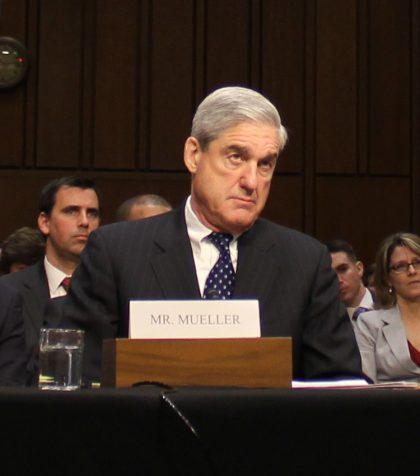Special investigator Robert Mueller laid the impeachment process squarely in the laps of Speaker of the House Nancy Pelosi and the rest Congress with his one and only public speaking engagement about the Russia investigation.
In a by-the-book press conference where he announced he would be resigning from his position as special counsel from the nearly two-year long investigation (May 2017-March 2019) into possible Russia interference into the United States’ electorate system in 2016, Mueller emphatically put the onus on Pelosi and her congressional colleagues to do something if they want to properly address the White House and President Donald Trump for possible high crimes and misdemeanors.
There was one particular segment during his nearly 10-minute press conference that seem to have given the Democratic-controlled House of Representatives that one final push to go ahead with impeachment queries, and that was when Mueller said the special counsel could not come to the conclusion to fully clear President Donald Trump of any wrongdoing or committing a crime.
“The Special Counsel’s Office is part of the Department of Justice and, by regulation, it was bound by that Department policy. Charging the President with a crime was therefore not an option we could consider,” Mueller said. “The Department’s written opinion explaining the policy against charging a President makes several important points that further informed our handling of the obstruction investigation. Those points are summarized in our report. And I will describe two of them: First, the opinion explicitly permits the investigation of a sitting President because it is important to preserve evidence while memories are fresh and documents are available. Among other things, that evidence could be used if there were co-conspirators who could now be charged. And second, the opinion says that the Constitution requires a process other than the criminal justice system to formally accuse a sitting President of wrongdoing.”

Mueller went on to had “And beyond Department policy, we were guided by principles of fairness. It would be unfair to potentially accuse somebody of a crime when there can be no court resolution of an actual charge. So that was the Justice Department policy and those were the principles under which we operated. From them we concluded that we would not reach a determination – one way or the other – about whether the President committed a crime. That is the office’s final position and we will not comment on any other conclusions or hypotheticals about the President.”
In Article 2, Section 4 of the U.S. Constitution, which was written in 1787, is straightforward when it comes to wrongdoing by anyone operating in the Executive Branch (President): The President, Vice President and all Civil Officers of the United States, shall be removed from Office on Impeachment for, and Conviction of, Treason, Bribery, or other high Crimes and Misdemeanors.
Mueller, was very measured in his words in describing the guidelines or parameters that he and the Special Counsel’s office operated from.
“The report has two parts addressing the two main issues we were asked to investigate,” Mueller said. “The first volume of the report details numerous efforts emanating from Russia to influence the election. This volume includes a discussion of the Trump campaign’s response to this activity, as well as our conclusion that there was insufficient evidence to charge a broader conspiracy. And in the second volume, the report describes the results and analysis of our obstruction of justice investigation involving the President. The order appointing me Special Counsel authorized us to investigate actions that could obstruct the investigation. We conducted that investigation and we kept the office of the Acting Attorney General apprised of the progress of our work. As set forth in our report, after that investigation, if we had confidence that the President clearly did not commit a crime, we would have said that.”
No doubt, those latter words by Mueller are going to create a political buzz around Washington, D.C. whether the Democratic-controlled House of Representatives will have the nerve or the backbone to go through with impeaching President Trump. If that was not enough to pour more coals on the fire when it comes to formal impeachment proceedings, then Mueller’s words about the core investigation itself, might be enough to move the needle.
“As alleged by the grand jury in an indictment, Russian intelligence officers who were part of the Russian military launched a concerted attack on our political system,” Mueller said. “The indictment alleges that they used sophisticated cyber techniques to hack into computers and networks used by the Clinton campaign. They stole private information, and then released that information through fake online identities and through the organization WikiLeaks. The releases were designed and timed to interfere with our election and to damage a presidential candidate. And at the same time, as the grand jury alleged in a separate indictment, a private Russian entity engaged in a social media operation where Russian citizens posed as Americans in order to interfere in the election.”
Mueller went on to state that “These indictments contain allegations. And we are not commenting on the guilt or innocence of any specific defendant. Every defendant is presumed innocent unless and until proven guilty in court. The indictments allege, and the other activities in our report describe, efforts to interfere in our political system. They needed to be investigated and understood. That is among the reasons why the Department of Justice established our office.”
Articles of impeachment must first come through the House of Representatives before it is taken up and voted on by the U.S. Senate, which needs two-thirds of a majority to oust a sitting President. Democratic President Bill Clinton was impeached in 1998 by the House of Representatives. The Senate failed to affirm that action, and as a result, President Clinton survived his second term in office.
President Trump might not get that opportunity should impeachment articles formulate in the House of Representatives. In a nutshell, Mueller unofficially laid out the blueprint for Pelosi and members of Congress to do their jobs.

Dennis has covered and written about politics, crime, race, sports, and entertainment. Dennis currently covers the NFL, MLB, NBA, NCAA, and Olympic sports. Dennis is the editor of News4usonline.com and serves as the publisher of the Compton Bulletin newspaper. He earned a journalism degree from Howard University. Email Dennis at dfreeman@news4usonline.com
